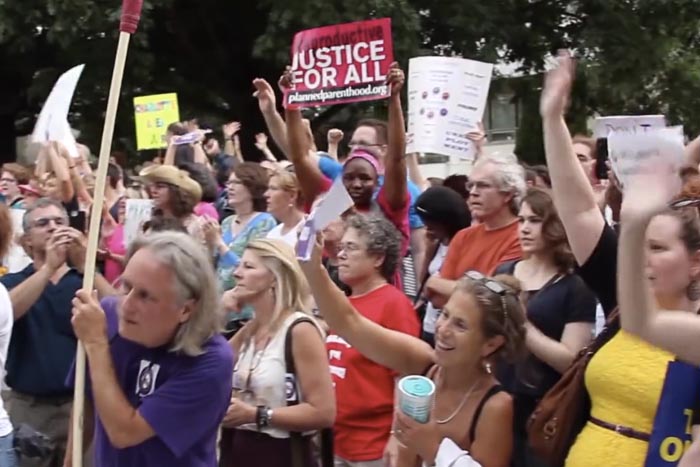What Is a ‘Women’s Issue’? Women of Color Challenge the Prevailing Narrative
All too often, when women of color are concerned about things outside of what appears to be the predominant white woman’s agenda, those things aren’t considered "women’s issues." But, we cannot tell women of color what issues are important to them.

Last summer, in response to an onslaught of attacks on abortion and contraceptive access by the North Carolina General Assembly, activists behind the Moral Mondays demonstrations decided to dedicate an upcoming protest to women’s issues. Moral Mondays gather folks from all over North Carolina to speak and engage in civil disobedience in response to dangerous policies enacted by the legislature. I was invited by its organizers to give the closing prayers for this particular Moral Monday.
Women were invited to talk about the Earned Income Tax Credit, equal pay, cuts to education, and of course, reproductive justice. And speak out they did. But, it fell two days after the George Zimmerman verdict. A man who had killed a 17-year-old Black child would walk free and the country was in mourning. So women also spoke out against gun violence, racial profiling, and held moments of silence for Trayvon Martin. At our statewide demonstration, spending time in mourning and reverence was more than important; it was essential to mourn and hold his life in reverence.
But not for all of us.
After this Moral Monday, something happened that shows how much work we still need to do in the women’s movement around race. An email from an individual who works closely with the women’s coalition and the National Association for the Advancement of Colored People went out expressing concern about the direction the event took. It complained that the focus seemed to be on Trayvon Martin and racial profiling. “This was about women’s issues,” the writer said.
To me, this felt like a slap in the face. What are “women’s issues,” exactly? All too often, when women of color are concerned about things outside of what appears to be the predominant white woman’s agenda, those things aren’t considered “women’s issues.”
We cannot tell women of color what issues are important to them. Implying that the grief of losing Trayvon Martin is not a women’s issue erases the experience of Black mothers across the United States. Facing stark realities, Black mothers have to raise their sons with mistrust of the police and constantly remind them how to avoid violence and arrest.
Lived experiences define the activism of women of color, not a narrowly prescribed list of issues. White women must learn about and respect the diversity of the lived experiences of women of color. Too often, though, it feels as if our colored faces are being used to speak on behalf of a white movement. Women of color are asked to be spokespeople for a movement we are not allowed to fully participate in.
In my experience, many white women in North Carolina put blinders on when it comes to the work women of color are already doing, perhaps because we aren’t doing it with them. When women of color are not joining with predominantly or historically white organizations, not using the language such as “my body” and “my choice,” are gathering on issues other than contraceptives or abortion, then white women often try to reach out to us and fold us into their movement.
If our “women’s issues” don’t fit within the prescribed list defined by white women, then we are told they do not count. Asking women of color to show up to events, participate in planning meetings, and knock on doors, but then saying that we cannot grieve the death of Black boys and express anger at the injustice of the justice system, is like asking us to host a dinner party and cook the food, but not letting us choose what’s on the menu.
Luckily leaders in the women’s movement in North Carolina have begun to recognize the deep and racist problems that cause some white women to consider only reproductive health and equal pay as women’s issues.
This year, we’ve already seen NARAL Pro-Choice North Carolina, SisterSong (a Black reproductive justice collective) and El Pueblo (a Latino youth organization) plan a Reproductive Justice Summit specifically for youth between the ages of 16 and 24, to hear what young people have to offer the movement.
North Carolina’s women also stood in solidarity with the recent “Standing Our Ground” conference, which included a discussion on reproductive justice for Marissa Alexander, an African-American woman and domestic violence survivor who was incarcerated and kept away from her child because of racial profiling and unjust domestic violence laws.
Supporting Marissa Alexander is both symbolic and important for North Carolina’s women because it shows that we consider all intersections for women’s concerns in the fight for reproductive justice. Yes, contraceptive coverage and abortion is important for reproductive justice, but couple those restrictions with dangerous gun laws, poor reporting of domestic violence, and racism, and a woman of color faces far more barriers in life than choosing when and how she raises a child. In fact, these barriers directly influence our reproductive decisions. They cannot be separated.
It is important for white-led movements to avoid simple “outreach” to women of color and instead collaborate with us, and learn about the work we are already doing. In order to build a strong, inclusive women’s movement that will empower all women in North Carolina, all women have to be included in both the planning and executing of all actions. We cannot call ourselves inclusive if we leave important voices out.
